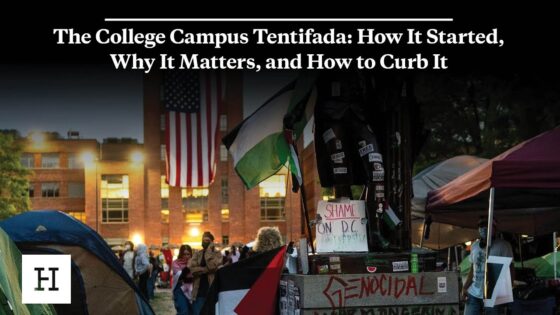NEW YORK, March 8 (JTA) – Daoud Salih, a Sudanese refugee, does not seem a likely advocate for revamping the Middle East studies department at Columbia University. But Salih says he shares the concerns of many Jewish students at the New York City school.
His story, and the story of other Africans expelled from or enslaved in Arab countries, is a narrative largely excluded from a college education in Middle Eastern studies, the African representative said.
In making their case at a daylong conference sponsored by pro-Israel groups and benefactors at Columbia University on Sunday, their views became a new dimension to an ongoing controversy engulfing the university’s Middle East and Asian Languages and Cultures Department.
Ever since the public screening last fall of “Columbia Unbecoming,” a film that documented the concerns of pro-Israel students who feel intimidated by faculty with anti-Israel views, the issue has embroiled the university and captured national headlines.
Charles Jacobs, president of the David Project, which produced “Columbia Unbecoming,” introduced the African speakers as an example of alternative viewpoints that could be integrated into the Middle Eastern studies department – and at the same time increase the numbers who support change in the university’s Middle East department.
The strident focus on the Palestinian cause – what he calls “Palestinianism” – to the detriment of other issues, Jacobs said, is a “highly cultivated weapon of mass distraction.”
The conference, which drew more than 300 people, came shortly after the Columbia committee investigating student charges of intimidation was expected to have handed down a report on the matter. But in a Feb. 28 letter to university President Lee Bollinger, the committee said it required more time to finish its report to the vice president for Arts and Sciences and a public summary of its findings by March 25.
The program was not timed to coincide with the report, however, said Edward Beck, president of Scholars for Peace in the Middle East, a group of 600 professors that fights anti-Semitism and anti-Zionism on campus, and a sponsor of the conference. The plenum, he said, was a “call for academic integrity” to “raise the level of scholarship when it comes to Middle Eastern studies.”
However, the pro-Israel side appeared to be the only one in attendance.
Beck said the group invited members of the MEALAC department and university officials to the conference, but neither responded to the invitation.
But according to Susan Brown, a university spokeswoman who attended the event, the invitation came in the form of a mass e-mail, not a direct invitation.
Brown also said that the university is “continually engaging in efforts to expand and diversify its regional studies programs.”
She noted, for example, the new Yosef Hayim Yerushalmi chair in Israel and Jewish studies, with a focus on modern Israel. Part of the money raised for the chair, named after a longtime Jewish studies professor at Columbia, will go toward bringing visiting professors from all disciplines at Hebrew University to teach at Columbia for a year.
Whether that chair will be part of the Middle East studies department is still unclear.
Other speakers at the conference included Israel’s minister for Diaspora affairs, Natan Sharansky, and Martin Kramer, a professor of Middle Eastern studies at Tel Aviv University, who addressed the group by video.
Sharansky said that when the Zionist narrative is lost from Middle Eastern studies, it is “not academic studies, it’s propaganda.” He was drawing on his familiarity with propaganda from life in the former Soviet Union.
He noted some irony in the fact that such a situation could arise at a university where the Student Struggle for Soviet Jewry was launched in the 1960s.
http://www.jta.org/page_view_story.asp?intarticleid=15122&intcategoryid=4




